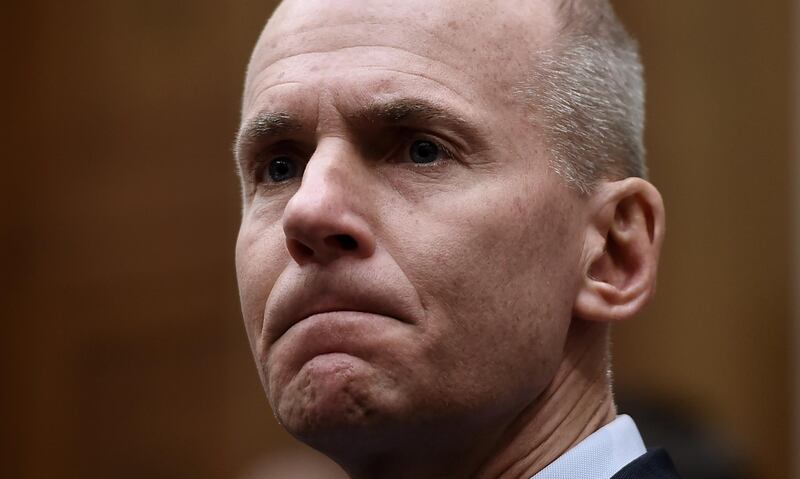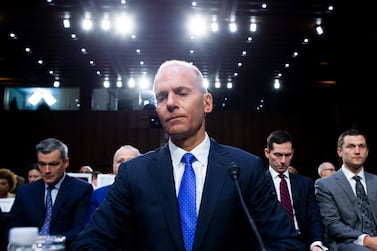Boeing’s new chief executive faces the formidable mission of restoring the grounded 737 Max to service, rebuilding relations with key stakeholders and repairing the company’s tattered reputation, analysts say.
David Calhoun, Boeing's chairman who replaced chief executive Dennis Muilenburg, will take on the role from January 13. The plane maker has suffered a series of setbacks in achieving clearance for the Max to fly again, delays to its 777X new wide-body and the embarrassing failure of its Starliner spaceship to dock at the International Space Station.
Boeing's shares rose 2.9 per cent at the end of trading in New York on Monday to $337.50 (Dh1,239) after the announcement of a management shuffle.
"The new CEO has a brutally tough battle ahead," said Eric Schiffer, chairman of Reputation Management Consultants. "It will take 24 to 36 months for the company to gain back investor and public confidence."

The world's biggest aerospace company ousted Mr Muilenburg after he failed to stem the fallout from two fatal crashes that grounded its best-selling 737 jet globally. The ban has run up to nine months and damaged Boeing's reputation with regulators and airline customers. The string of impediments following the two crashes that claimed 346 lives revealed Mr Muilenburg's struggle in resolving the crisis that has cost Boeing $9 billion so far, hurt airlines, distressed suppliers and threatened to slow the growth of US economy.
“If Boeing kept on Muilenburg, the company would be on a suicide flight as a brand,” Mr Schiffer said.
Mr Calhoun, a former General Electric executive who has been on the Boeing board since 2009, is taking over the company during the worst crisis in its 103-year history.
“David Calhoun will be a better communicator and should present a better outside image for Boeing with Congress, regulators, suppliers, and customers,” Richard Aboulafia, aerospace analyst with Teal Group, said. “This should help stabilise the company’s situation.”
Appointing Mr Calhoun to the top job is a “step in the right direction” and his biggest challenge will be shifting the company’s focus from profit to the basic fundamentals, according to George Ferguson, senior aerospace analyst at Bloomberg Intelligence.
“The priority is returning the company to a focus on fundamentals of good engineering, making long-term decisions about product, being transparent with employees, customers, regulators and investors,” Mr Ferguson said.
“Boeing seems to be too focused on the financials which has hurt the fundamentals of the business.”
Analysts say Mr Muilenburg's removal from the company is long overdue, after policymakers and families of crash victims called for his removal, though the incoming chief executive is still from within Boeing's old ranks.
“The leadership inside Boeing are flawed parts of the problem that led to disaster,” Mr Schiffer said.
Mr Calhoun’s background in private equity also may not be the best fit for a company that needs to strengthen focus on its engineering and products.
“In the long run he may not be the best choice,” Mr Aboulafia said. “For years, top Boeing executives have come from that background, and it might be the wrong approach for an engineering company that needs to restore its programme management and new product development capabilities.”
Mr Calhoun, 62, is a few years away from the traditional Boeing executives’ retirement age at 65 years, and one of his upcoming tasks would be to find a successor.
"He is likely to have a relatively short tour of duty at Boeing," said Robert Stallard, an analyst at Vertical Research Partners. Mr Calhoun's priorities will be "getting the 737 Max back into service without further aggravation, and starting the process of finding a new CEO and senior management team that can potentially get Boeing back on track".
US policymakers also backed the dismissal of Mr Muilenburg.
“It’s clear Dennis Muilenburg’s [removal] was long overdue,” Peter DeFazio, chair of the US House of Representatives’ transportation committee, said. “Under his watch, a long-admired company made a number of devastating decisions that suggest profit took priority over safety.”
Boeing on Monday said the leadership change “was necessary to restore confidence in the company moving forward as it works to repair relationships with regulators, customers, and all other stakeholders”.








